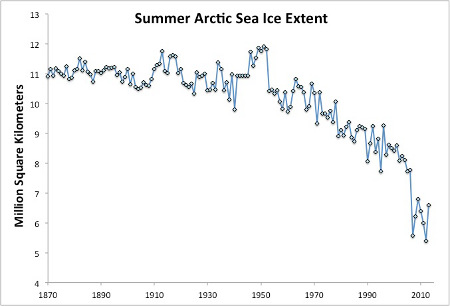One
of the clear signs that someone has an agenda is when they cherry pick the
data. It’s a common mistake to focus too much on the short term at the expense
of the longer view. A recent example of this is the cover of Arctic Sea
ice. Skeptics are claiming that sea ice has undergone a recent recovery, and
therefore, along with the apparent stalling of global warming as measured by
atmospheric temperatures, climate change is a myth. This is simply not true.
Arctic
sea ice loss has been steadily occurring for some time. Satellite observations
show it has been in decline since 1979 when observations first began.
Observations from the Danish Meteorological Institute and Norwegian Polar
Institute and ocean vessels have shown sea-ice cover is much lower than it has
been since 1870. Studies of older climate from tree rings, ice cores and lake
sediments can take us back even further, showing sea-ice is at its lowest for
over 1400 years.
Perhaps
the best way to think about sea ice loss is to compare blocks of cheddar cheese
to cheese slices. If you want to cut a slice off a slice of cheddar, you cut it
length ways, with each slice of equal thickness. With each slice you cut off,
the surface area of cheese decreases. Compare that to cheese slices. Each time
you remove a slice, the surface area remains the same but the thickness of the
cheese decreases.
The
melting of sea ice is like the removal of cheese slices, except sea ice varies
in thickness. The thickness of ice reflects its age, with the thinnest ice
being last season’s freezing and the thickest being from multiple years of
freezing. Each summer, sea ice thins due to warming temperatures. Consider a
distribution of sea ice where 25% is less than one metre. If during a summer
season, there is a total of one metre of thinning, then there will be a 25%
reduction in total sea ice. If that distribution changes over time such that
50% has a thickness of one metre, then the same summer time melting reduces the
area but 50% instead of 25%.
This
is what has been observed over time, sea ice has thinned, or another way of
describing it is that total ice volume has decreased, due to warming air and
ocean temperatures. Over shorter timescales, individual weather events can
dramatically affect the total surface area of ice as thin ice can rapidly grow.
For example, in 2012, a low pressure system spent nearly two weeks churning up
ice already thin from a warm start to the season resulted in the lowest sea ice
cover on record, though scientists think the ice would have reached a record
low anyway. This year’s so-called recovery simply means that low pressure
systems have brought snow fall and not damaged the ice, resulting in the 6th
lowest sea ice cover on record.
Image from Skeptical Science shows so called recovery is simply a growth in area due to seasonal differences.
The
moral of this story is that various key indicators of climate change do vary
naturally on short time scales, be it year to year or over a few decades. This
does nothing to change the longer term trends due to the burning of fossil
fuels, land clearing and other drivers of climate change.
Further
reading
http://www.skepticalscience.com/arctic-sea-ice-recovers-to-6th-lowest-extent-in-millennia.html
is at a popular level and contains references
http://www.washington.edu/news/2013/01/31/cyclone-did-not-cause-2012-record-low-for-arctic-sea-ice/
discusses the 2012 record low and the role the Great Arctic Cyclone
played
http://www.pnas.org/content/106/49/20590.abstract?sid=78edbb84-7202-4498-9e02-bd52e449ac7f
discusses the idea of tipping points and illustrates how sea ice varies from
year to year. Moderately technical.


